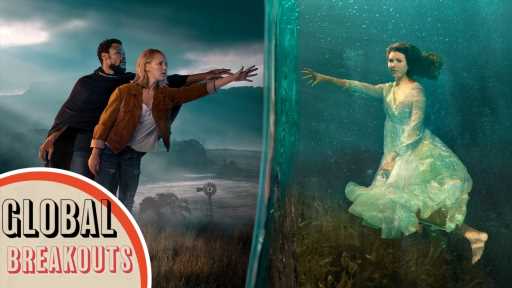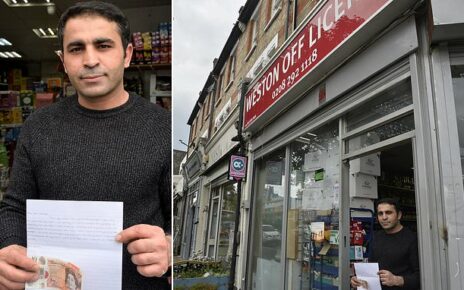Welcome to Global Breakouts, Deadline’s fortnightly strand in which we shine a spotlight on the TV shows and films killing it in their local territories. The industry is as globalized as it’s ever been, but breakout hits are appearing in pockets of the world all the time and it can be hard to keep track… So we’re going to do the hard work for you.
This week we’re headed to South Africa, where psychological thriller drama DAM has captured eyeballs through its mix of mystery, social commentary and supernatural elements. The second season dropped earlier this year and is one of streamer Showmax’s top series. With nods to Ire Levin-era dramas like Rosemary’s Baby and The Boys From Brazil, DAM is part of a growing roster of South African TV series and films making a mark across the African continent and beyond.
Related Story
'Yellowjackets' Season 2 Premiere Doubles Audience During Debut Week With Nearly 4M Viewers
Name: DAM
County: South Africa
Network: Showmax (Pan-Africa)
Producer: Picture Tree
For fans of: Ira Levin’s Rosemary’s Baby and The Boys From Brazil, early Sam Raimi films
Distributor: MultiChoice Studios
There has been a quiet revolution in South African production over the last few years. In part triggered by Netflix’s entrance into the originals market in 2020, quality has been rising across the board and ambitions growing as more international shoots arrive on the country’s shores.
Local market leading pay-TV service MultiChoice and its streaming service Showmax have had to contend with the influx of global streamers. It has gone about building out a slate of impressive titles, some co-produced with shareholder Canal+ and others fully financed in-house despite the rising costs of scripted series. DAM has been among its most successful originals to date.
The drama, from filmmaker Alex Yazbek and produced in association with Picture Tree, is billed as a “twisty and twisted psychological thriller” set in the Eastern Cape starring the likes of Lea Vivier, Pallance Dladla and Natasha Loring.

Two seasons of the show have gone out on Showmax to date. In 2021, the eight-part Season 1 was a top-10 most-watched show on the service, and went on to become the most nominated drama series at the 2022 South African Film and Television Awards (winning two). Contrary to the first run, Season 2 was released weekly from February 16 this year, culminating with a sixth and final episode on March 23. The production crew is particularly strong, with Yazbek a four-time SAFTA winner, cinematographer Tom Marais, a veteran of 2018 Gary Oldman and Gerard Butler film Hunter Killer, and Sue Steele, an award-winning production designer.
Season 1 follows Yola (Vivier), who returns home from Chile for her father’s funeral, only to be met by the ghosts of her past when she inherits his home. Cults, institutionalization, monsters and family strife are all explored, as Yola assesses whether her demons are real or just in her head.
Season 2 is set three months after the culmination of the first run and explores Yola’s mental state after she returns from the funeral, as she is forced to put the missing pieces together and discovers “diamonds, mass graves and monsters surfacing in the dam.”

Among the returning cast were Dladla and Loring, who won a SAFTA for her role as Yola’s conflicted sister, Sienna, in season one.
“What I love about the show is that it doesn’t really define itself in any way,” Loring said in an interview earlier this year. “It’s got a little bit of drama, a little bit of horror and some mythical and thriller elements. There’s quite a bit of comedy in it, too. There’s a mesh of all the genres together; that’s what makes it interesting and different.”
“DAM shows that the South African audience is open to more genres than have been catered for historically, and this allows us to continue to try new things and push the boundaries,” Showmax Executive Head of Content Allan Sperling tells Deadline.
Locally, the show has been lauded for breaking the mould of South African TV, with its diverse cast, intricate storytelling and unique creative viewpoint. Showrunner Yazbek tells Deadline his vision was to include actors and crew from all parts of a local entertainment market that can be quite disparate, where white-, black- and Afrikaans-led shows and films tend to adhere to certain stereotypes. He desired a melting pot.
“In South African TV, we all have our own room: A room for the black people, a room for the Afrikaans people and a room for the English-speaking white people, and never do those rooms lead into each other,” says Yazbek. “A white person in an Mzansi show, which predominantly has a black audience, is a bad guy. A black person in an Afrikaans show is a waiter or they do service. They’re patronized. It’s awful and I hate it.

“I wanted to paint a fictional picture of South Africa that’s the reality in Johannesberg – a melting pot where the extremes in poverty and wealth are exceptional. This is one of the first shows where everyone interacts, even in conflict.”
A student of South African literature, Yazbek wanted to mould all of those elements within a central idea to the country’s spiritual history: The ghosts of your past are always with you. “It’s the idea that if things aren’t going right, you haven’t done right by your ancestors,” he explains. “It’s an excellent idea that speaks to our mythology, religion and TV genres I love like horror and psychological thriller. This appeals to South Africans as entertainment and also respectfully on a spiritual level.”
This narrative mechanism is why the show has successfully attracted South Africans of all ethnic, racial and financial backgrounds to the show, he believes. “It has bridged the divide that is so defended by our broadcasters.”
Yazbek believes South Africa must face the traumas of its past, which is still defined internationally by Apartheid, and move towards a more “truthful” way of making films and TV that highlights the other kinds of conflicts that still exist. He notes there are often “adversarial” elements to relations between, for example, between the Afrikaans population and English-speaking white people. “I will not be manipulated by my guilt,” says Yazbek. It was for this unifying goal that he chose to shoot in English, the language common to the most South Africans.
Driving Shoots To The Eastern Cape
DAM has also been credited with driving a trend towards shooting in the Eastern Cape, where telenovelas, drama series and reality TV has filmed this year. Blood Psalms, another big Showmax drama, shot in the region. More broadly, South Africa is attracting more and more projects, with a 25% TV and film tax incentive and a skilful production sector adding to the obvious visual attractions of such a beautiful country.
“Alex Yazbek and Tom Marais really made the most of the Eastern Cape locations, which became a character in themselves and marked a welcome change from the cities we usually see on South African TV,” says Showmax’s Sperling. “DAM, Glasshouse and last year’s epic fantasy Blood Psalms definitely reminded the industry of just how beautiful the Eastern Cape can look on screen, and of the rich cultural context it adds to stories.”

He adds Showmax is “committed to empowering local filmmakers to tell their own stories authentically for their own communities in their own languages, so we’re delighted to see a marked increase in Xhosa productions emerging from the Eastern Cape this year, including reality series like 1Magic’s The Real Housewives of Gqeberha, Mzansi Magic telenovelas like Gqeberha: The Empire and Showmax Originals like DAM Season 2.”
Besides having “great actors” to work with on DAM, Yazbek says “the slow input of bigger budgets” has allowed him and his peers to “dare to dream” for a brighter future for South African entertainment. “It feels like there’s been an upsurge in good product,” he says, while noting ruefully, “Obviously there’s a lot of dreck (trash) that gets made as well.”
The bigger budgets mean more ambitious ideas are being ordered — think Mandlakaise Dube’s upcoming remake of Jane the Virgin or M-Net’s White Lies, which counts Game of Thrones’ Natalie Dormer as lead.
Now primed for international success, DAM is sitting at the forefront of South Africa’s production revolution.
Must Read Stories
Disney EMEA Staff Bracing For Layoffs & Content Cuts

Michael Mann Eyeing ‘Heat 2’ As Next Film; Warner Bros In Negotiations, Adam Driver In Talks

Sets Strike Authorization Vote Date: “Must Demonstrate Our Willingness To Fight”

Donald Trump Wins Bid To Keep TV Cameras Out Of Tuesday’s Arraignment Hearing

Read More About:
Source: Read Full Article



